Our Library
Explore our publications, from research papers and series to educational materials, covering all aspects of conflict transformation and peace promotion.
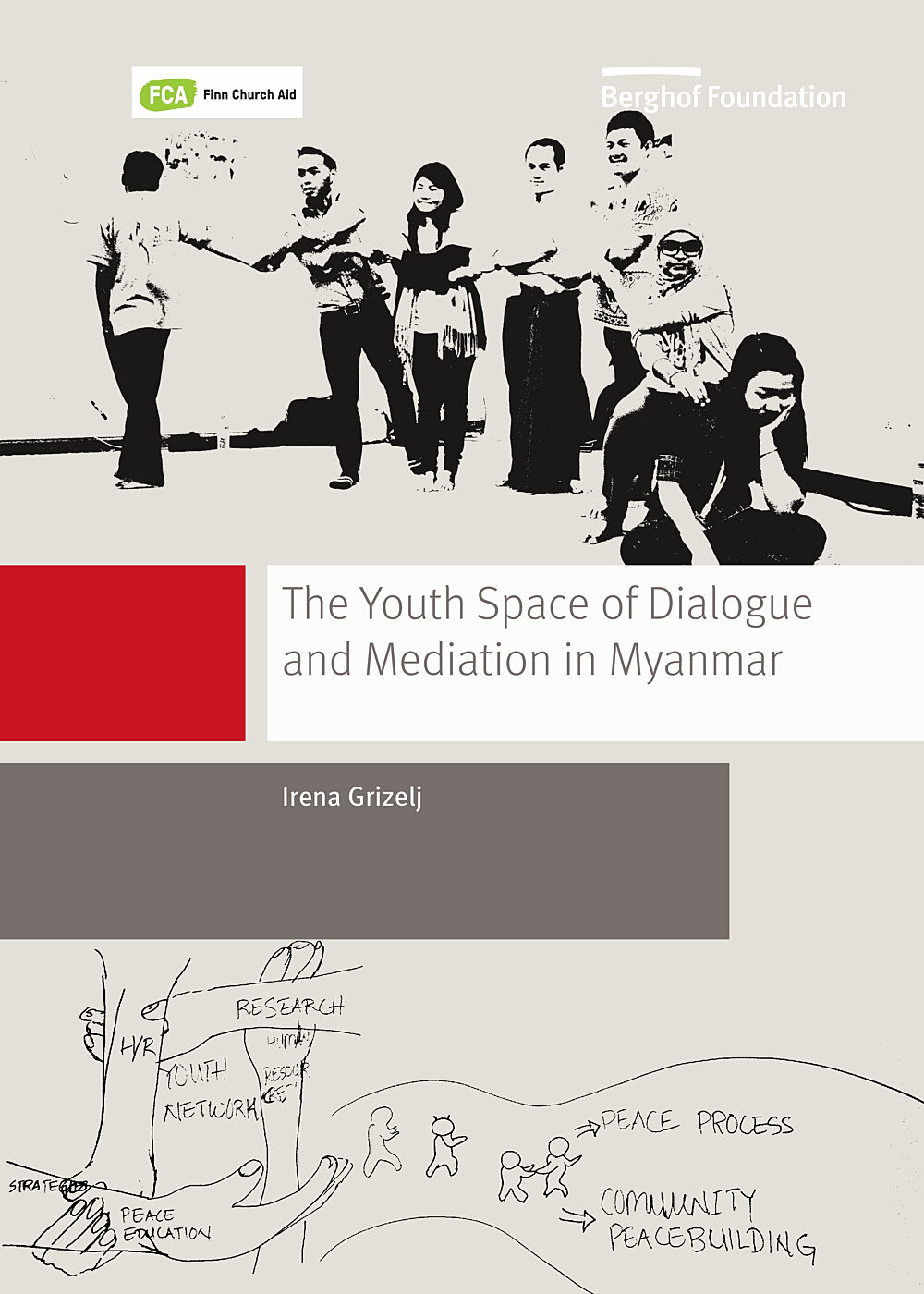
The Youth Space of Dialogue and Mediation in Myanmar
This paper is part of a broader exploratory study on the youth space of dialogue and mediation. Young people’s efforts in transforming conflict across the globe are abundant and are to some extent documented. In conflict research, however, there is a lack of reflection on the particularities of the youth approach and contribution to dialogue and mediation processes. In an attempt to offer some preliminary reflection, this paper explores the youth space of dialogue and mediation — its characteristics, dynamics, dimensions, challenges and potential — in the context of Myanmar.
- Year2017
- Author(s)Irena Grizelj
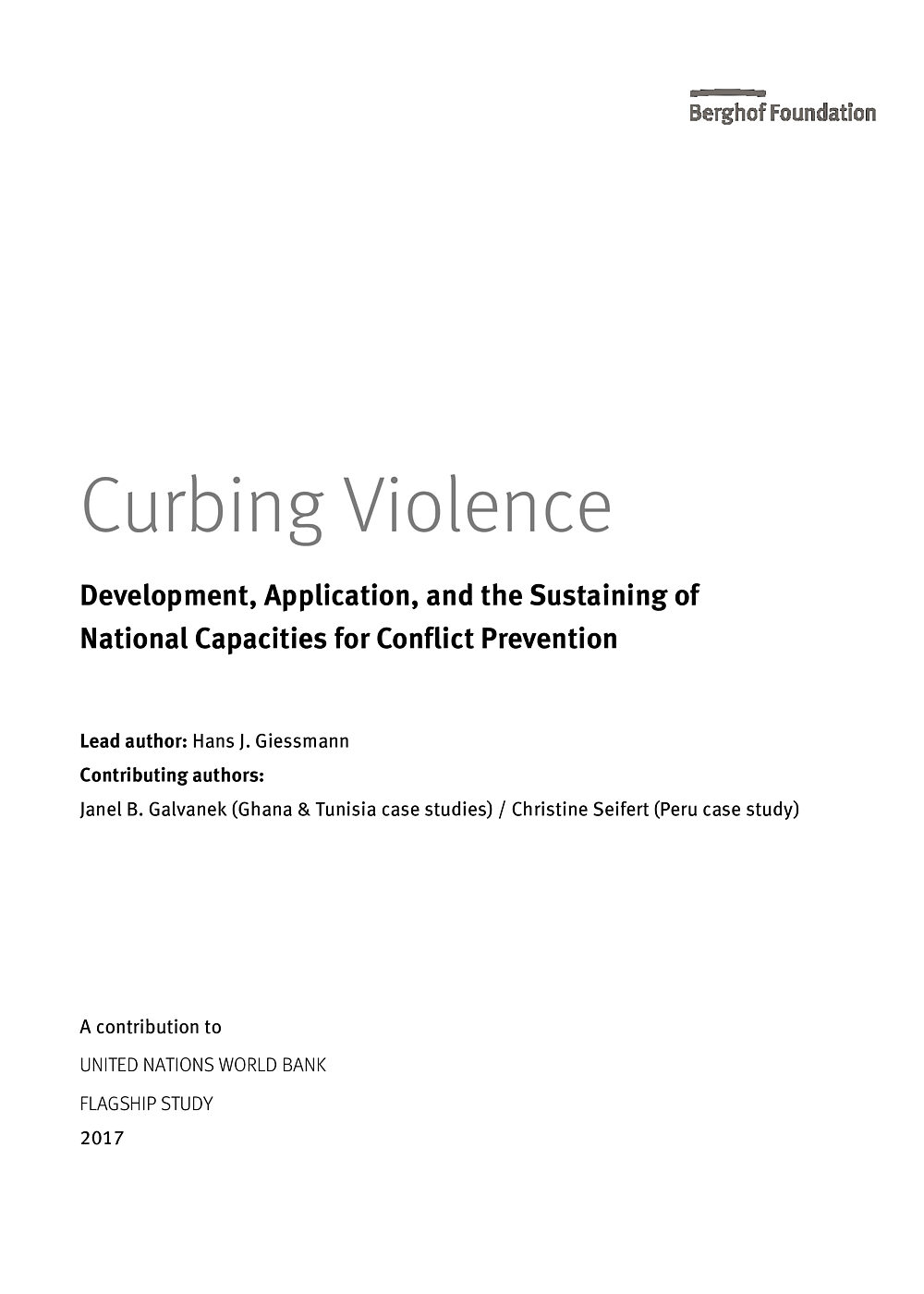
Curbing ViolenceDevelopment, Application, and the Sustaining of National Capacities for Conflict Prevention
Contributing to the new World Bank’s Flagship Study "Pathways for Peace. Inclusive Approaches to Preventing Violent Conflict", this research study sheds light on and draws lessons from cases wherein specific national and related sub-national capacities for the prevention of violent political and social conflict were developed and applied by key domestic actors in internally-led processes of conflict prevention. In doing so, the research has focused on countries where complementary external support was provided through NGOs or by governments primarily under the development assistance umbrella. Hence, insights and recommendations from this research may also feed back into the Joint UNDP-DPA Programme on Building National Capacities for Conflict Prevention.
- Year2017
- Author(s)Hans-Joachim Giessmann, Janel B. Galvanek, Christine Seifert
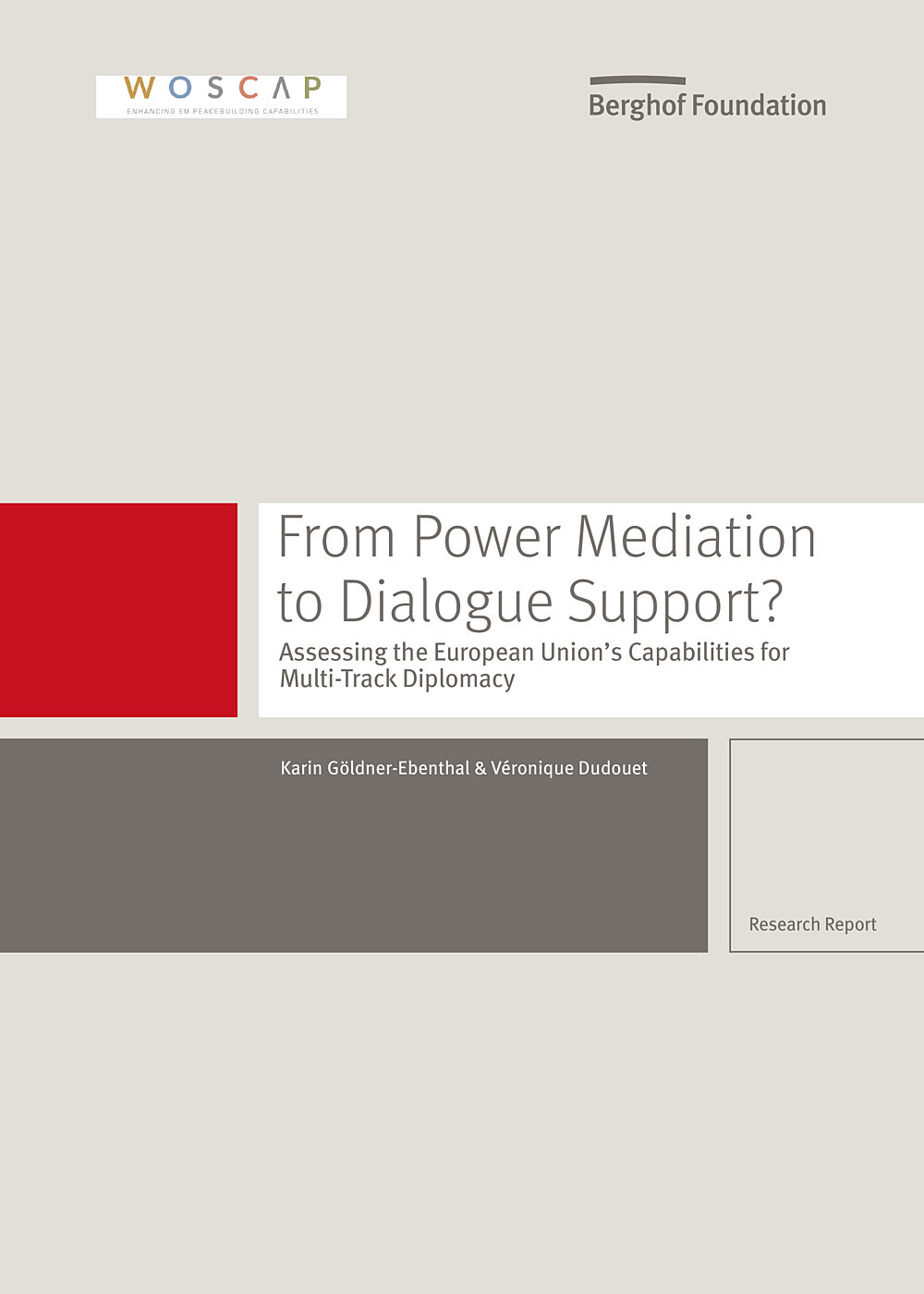
From Power Mediation to Dialogue Support?Assessing the European Union's Capabilities for Multi-Track Diplomacy
This paper presents results from the European Union Horizon 2020-funded project “Whole-of-Society Conflict Prevention and Peacebuilding” (WOSCAP). It is one of three cross-country comparative assessments of EU capabilities for conflict prevention and peacebuilding with regards to various thematic 'clusters' of external intervention. The other two comparative studies deal with EU support for security sector reform and decentralisation reform. The empirical contents are primarily based on field research carried out by local partner organisations in Mali, Yemen, Georgia and Ukraine.
- Year2017
- Author(s)Karin Göldner-Ebenthal, Véronique Dudouet
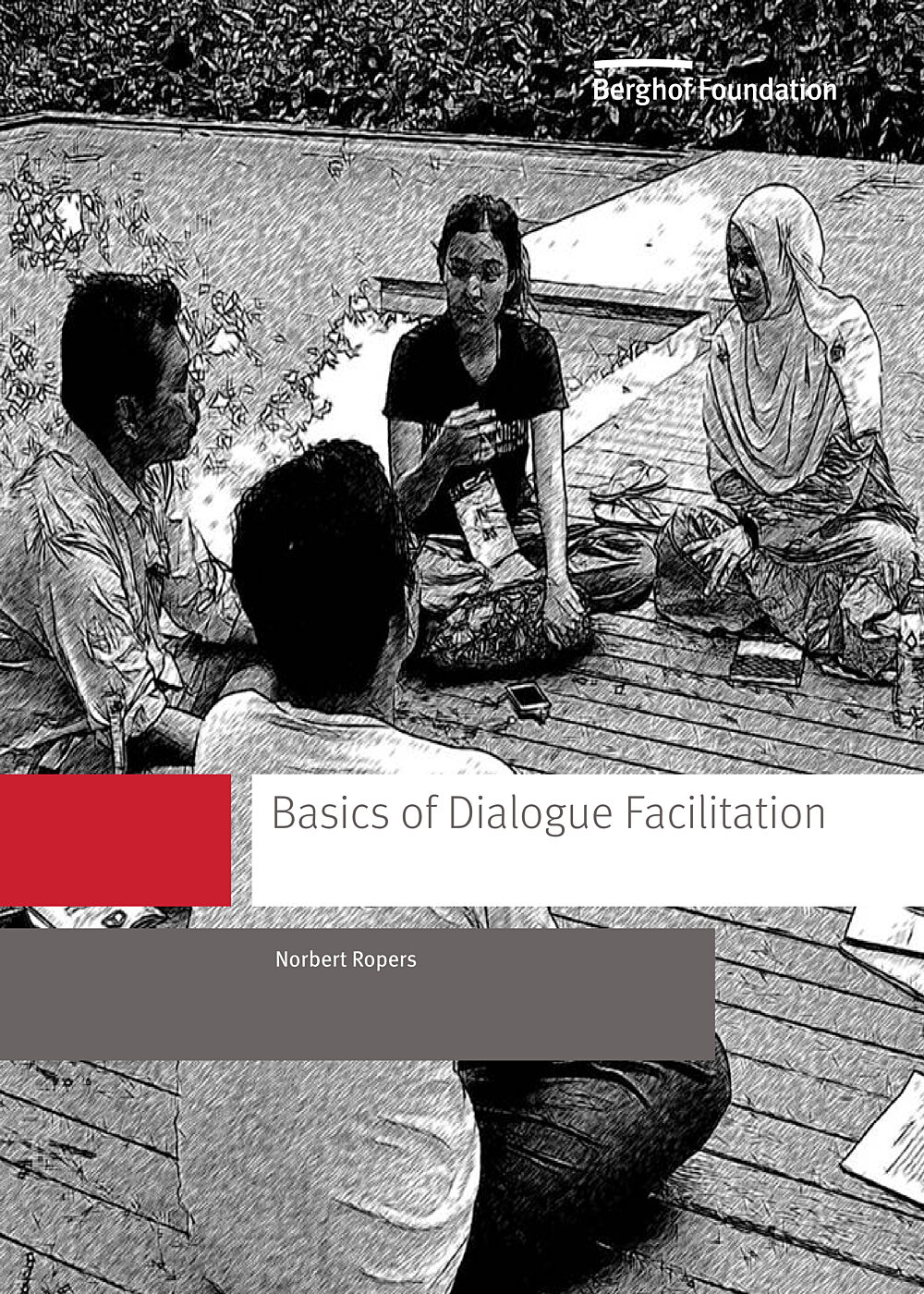
Basics of Dialogue Facilitation
This small booklet aims at providing some guidance, inspiration and practical tools for those who are engaged in the planning and facilitation of dialogue processes or who are advocating for dialogue as a means for solving conflict. Initially, the publication started out as a handout, sharing insights into setting up and conducting constructive dialogues around contentious issues specifically in contexts of violence-prone conflict.
- Year2017
- Author(s)Norbert Ropers
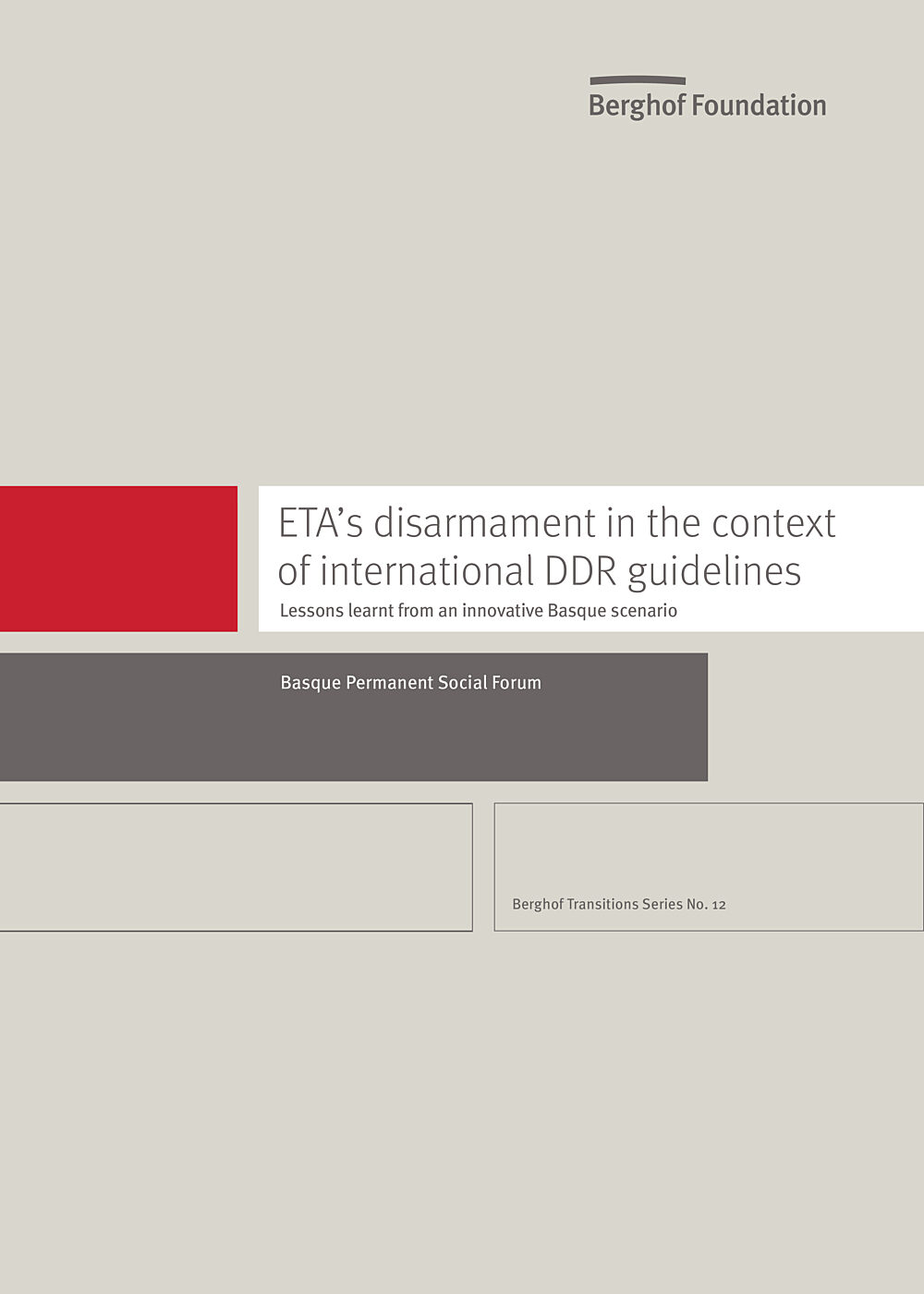
ETA’s disarmament in the context of international DDR guidelines: Lessons learnt from an innovative Basque scenarioTransitions Series No. 12
This report presents a unique perspective on a unique experience that can inspire local and international peacebuilding practitioners in many parts of the world where armed conflicts are still raging or where peace processes are grappling with the intricacies of disarmament, demobilisation and reintegration (DDR) processes.
- Year2017
- Author(s)Basque Permanent Social Forum
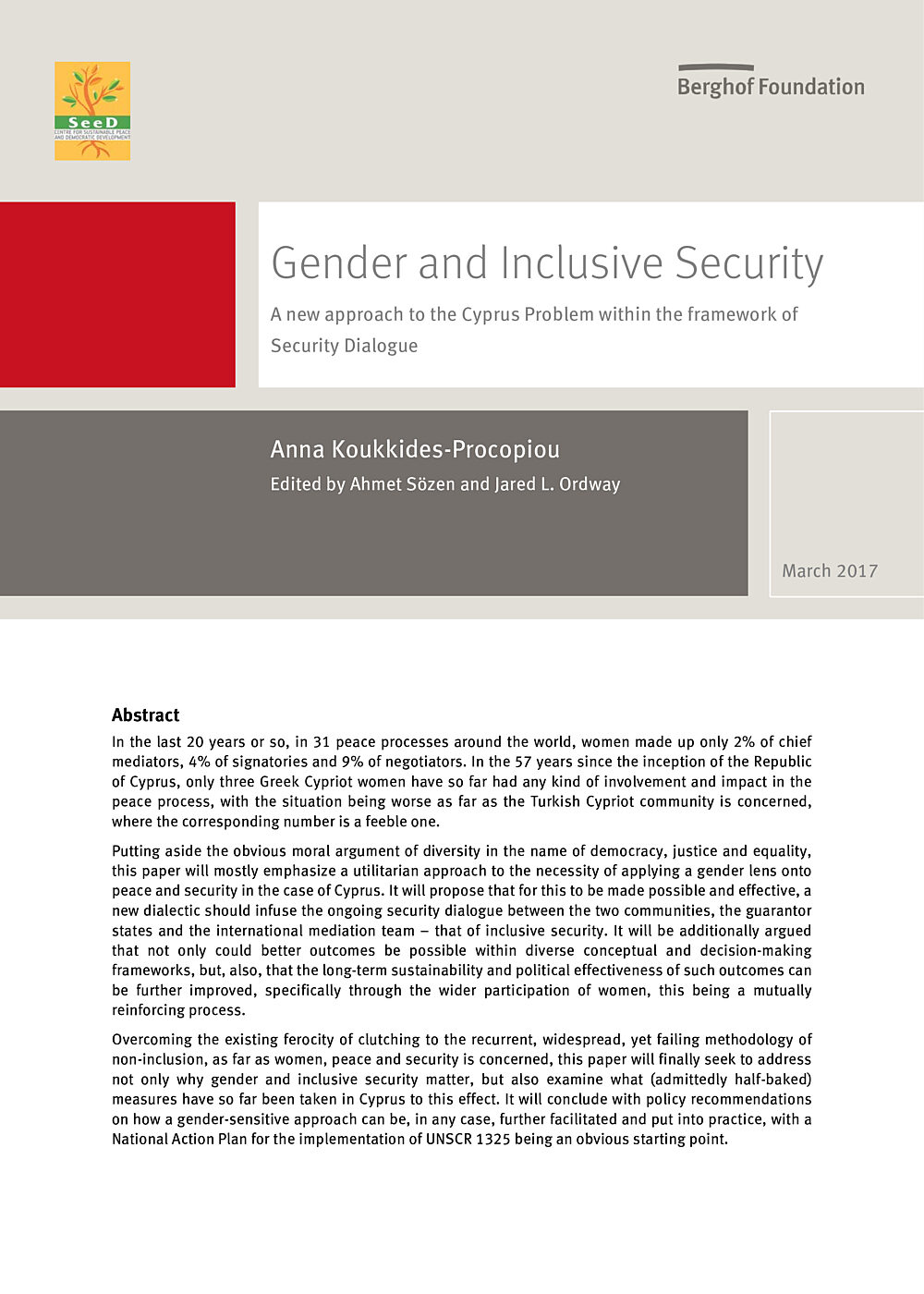
Gender and Inclusive Security: A new approach to the Cyprus Problem within the framework on Security DialogueSecurity Dialogue Project - Background Paper
In the 57 years since the inception of the Republic of Cyprus, only three Greek Cypriot women have so far had any kind of involvement and impact in the peace process, with the situation being worse as far as the Turkish Cypriot community is concerned, where the corresponding number is a feeble one.
- Year2017
- Author(s)Anna Koukkides-Procopiou
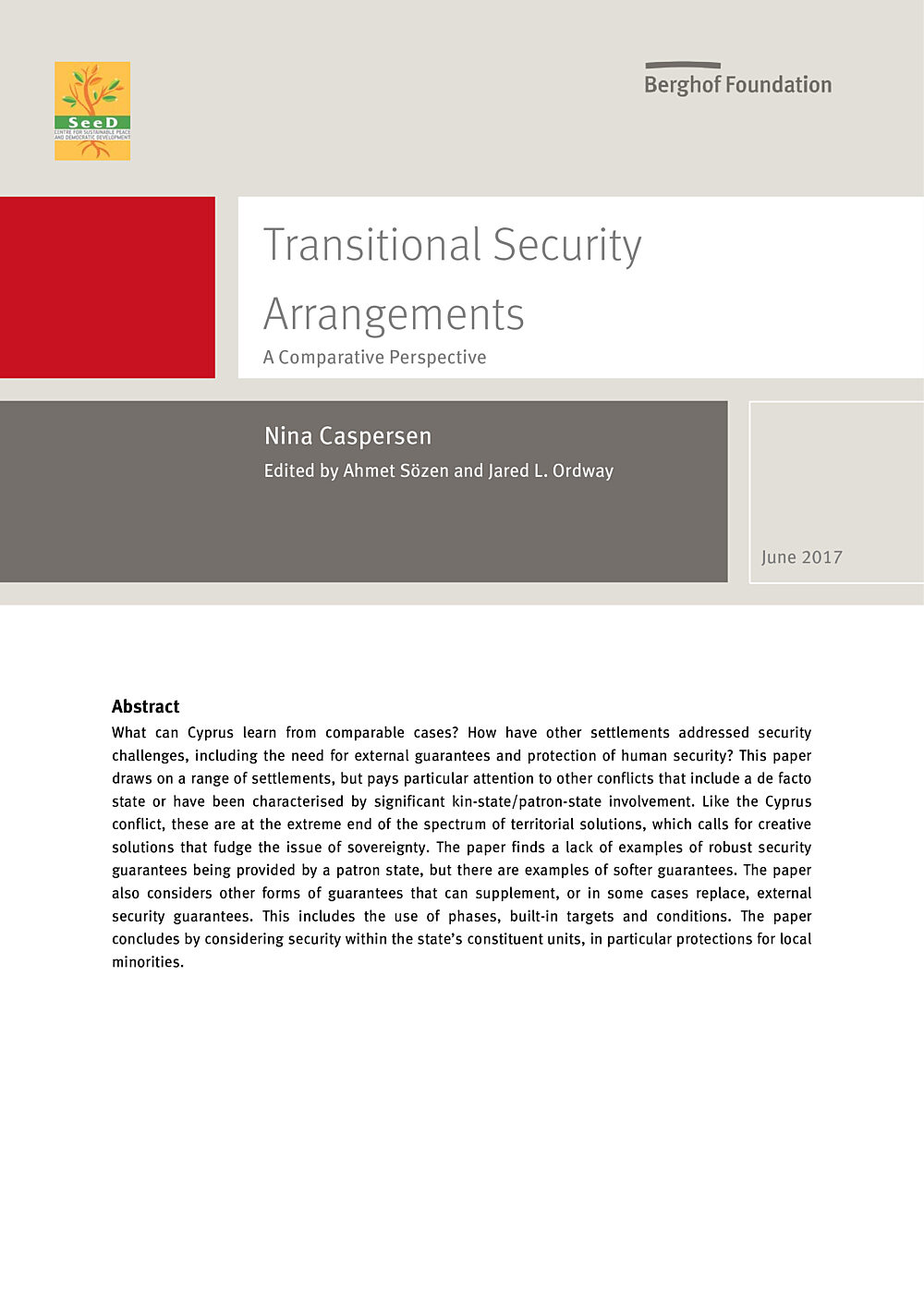
Transitional Security Arrangements: A Comparative PerspectiveSecurity Dialogue Project - Background Paper
What can Cyprus learn from comparable cases? How have other settlements addressed security challenges, including the need for external guarantees and protection of human security? This paper draws on a range of settlements, but pays particular attention to other conflicts that include a de facto state or have been characterised by significant kin-state/patron-state involvement. Like the Cyprus conflict, these are at the extreme end of the spectrum of territorial solutions, which calls for creative solutions that fudge the issue of sovereignty. The paper finds a lack of examples of robust security guarantees being provided by a patron state, but there are examples of softer guarantees. The paper also considers other forms of guarantees that can supplement, or in some cases replace, external security guarantees. This includes the use of phases, built-in targets and conditions. The paper concludes by considering security within the state’s constituent units, in particular protections for local minorities.
- Year2017
- Author(s)Nina Caspersen
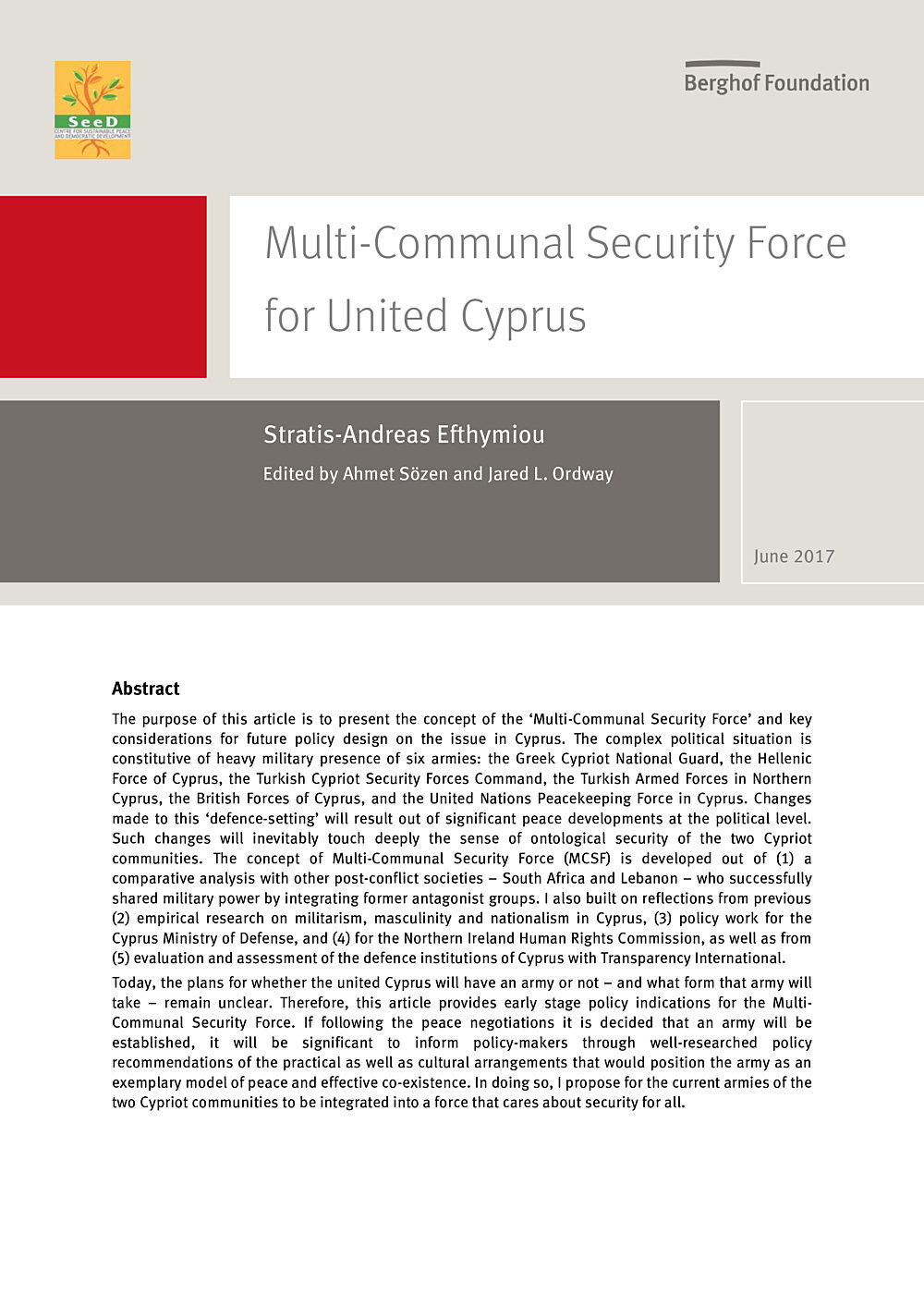
Multi-Communal Security Force for United CyprusSecurity Dialogue Project - Background Paper
The purpose of this article is to present the concept of the ‘Multi-Communal Security Force’ (MCSF) and key considerations for future policy design on the issue in Cyprus. It is developed out of (1) a comparative analysis with other post-conflict societies – South Africa and Lebanon – who successfully shared military power by integrating former antagonist groups. It also builds on the author's reflections from previous (2) empirical research on militarism, masculinity and nationalism in Cyprus, (3) policy work for the Cyprus Ministry of Defense, and (4) for the Northern Ireland Human Rights Commission, as well as from (5) evaluation and assessment of the defence institutions of Cyprus with Transparency International.
- Year2017
- Author(s)Stratis-Andreas Efthymiou
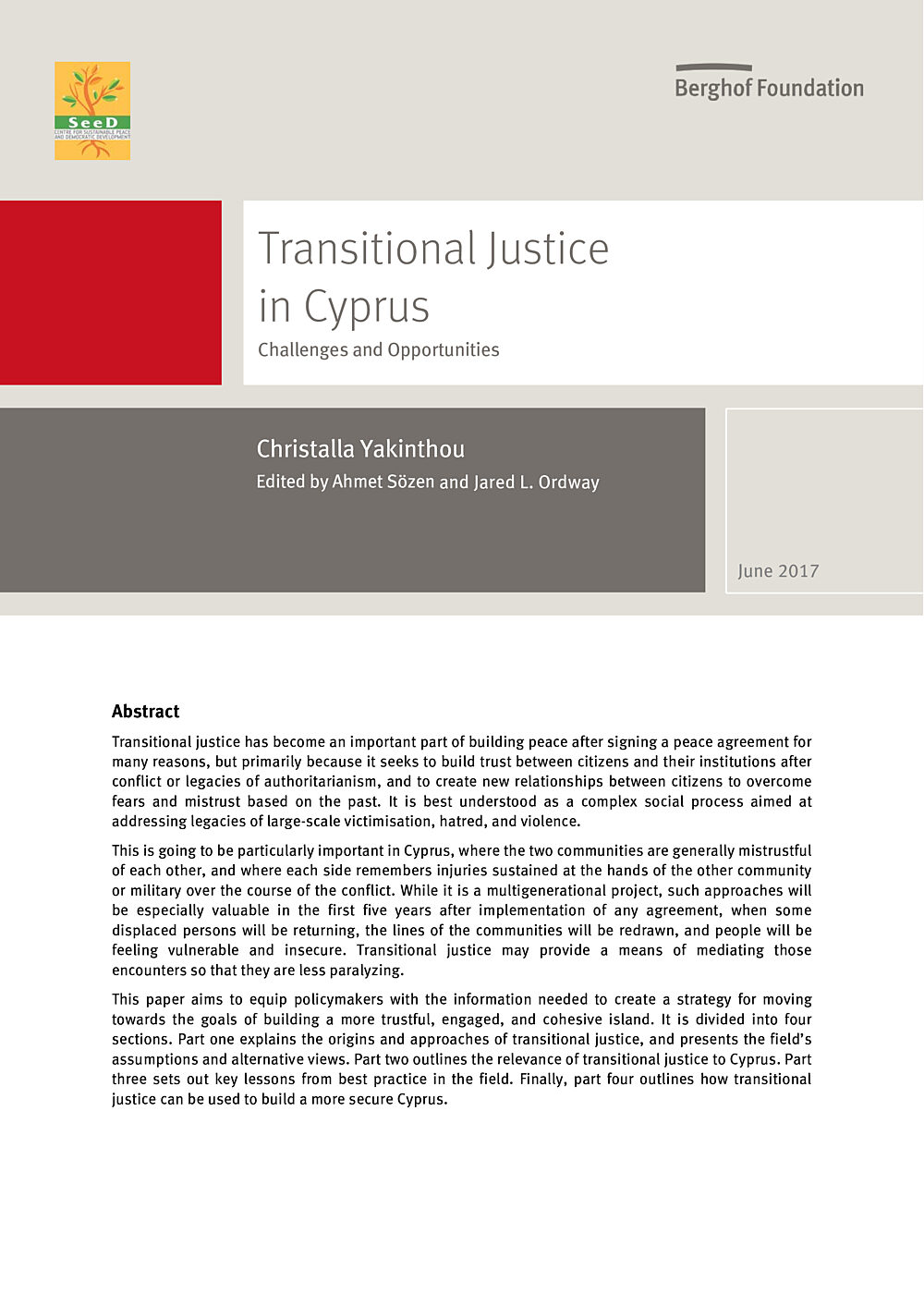
Transitional Justice in Cyprus: Challenges and OpportunitiesSecurity Dialogue Project - Background Paper
Transitional justice has become an important part of building peace after signing a peace agreement for many reasons, but primarily because it seeks to build trust between citizens and their institutions after conflict or legacies of authoritarianism, and to create new relationships between citizens to overcome fears and mistrust based on the past. It is best understood as a complex social process aimed at addressing legacies of large-scale victimisation, hatred, and violence.
- Year2017
- Author(s)Christalla Yakinthou
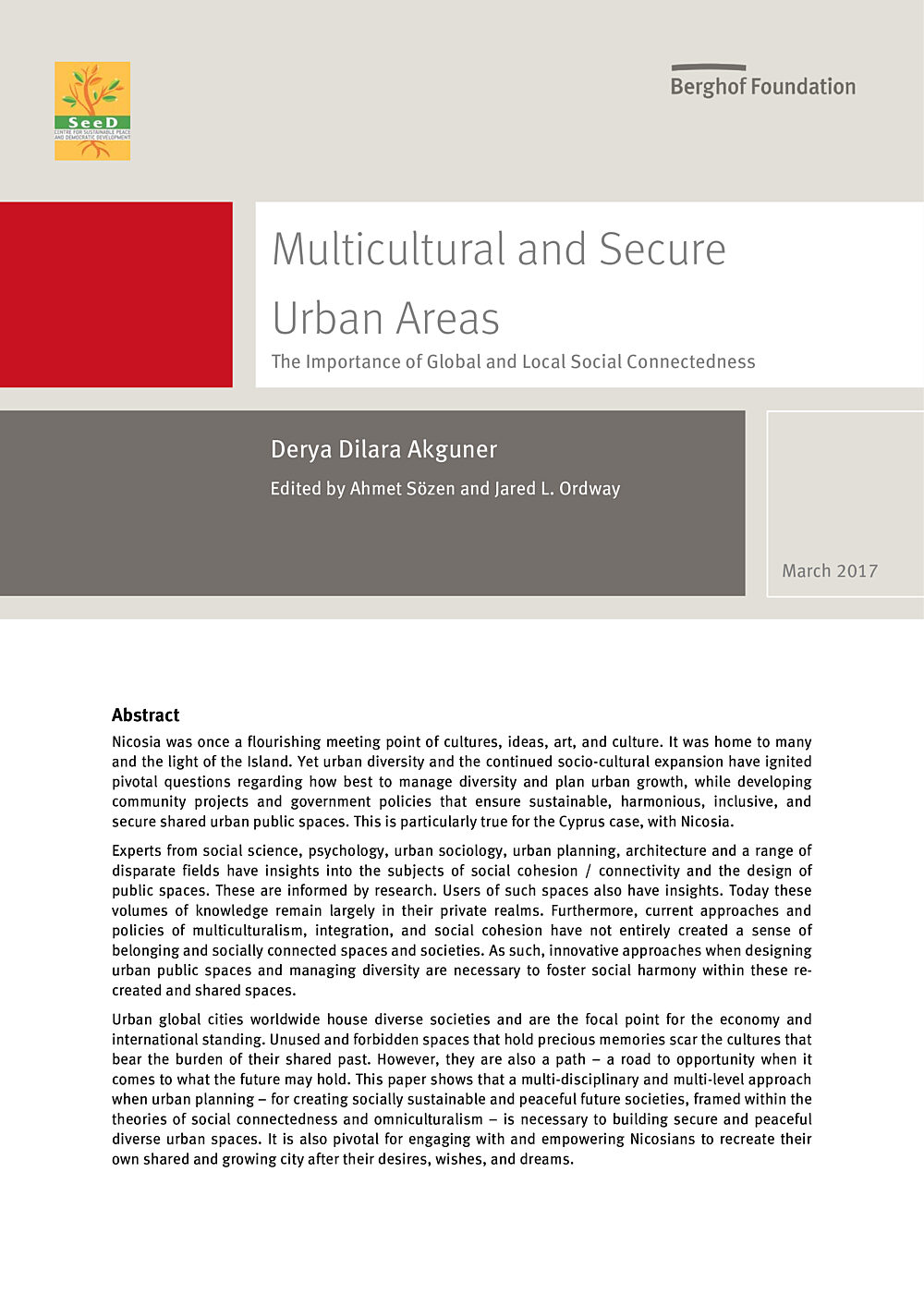
Multicultural and Secure Urban Areas: The Importance of Global and Local ConnectednessSecurity Dialogue Project - Background Paper
Nicosia was once a flourishing meeting point of cultures, ideas, art, and culture. It was home to many and the light of the Island. Yet urban diversity and the continued socio-cultural expansion have ignited pivotal questions regarding how best to manage diversity and plan urban growth, while developing community projects and government policies that ensure sustainable, harmonious, inclusive, and secure shared urban public spaces. This is particularly true for the Cyprus case, with Nicosia.
- Year2017
- Author(s)Derya Dilara Akguner